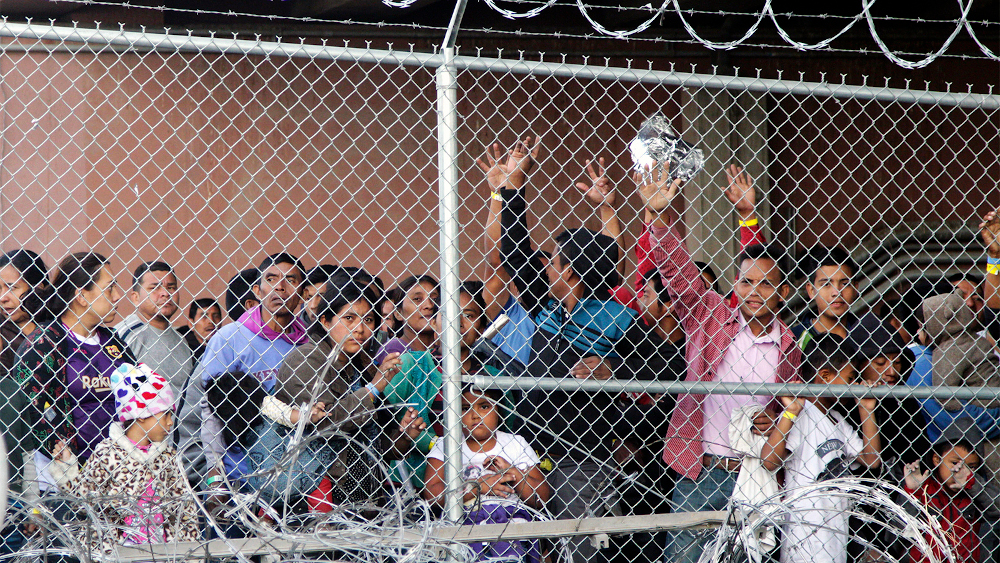
Central American migrants wait for food in El Paso, Texas, on March 27, 2019, in a pen erected by U.S. Customs and Border Protection to process a surge of migrant families and unaccompanied minors. (AP/Cedar Attanasio)
About 300 Latino Catholic theologians and activists will hold a teach-in in El Paso, Texas, this weekend (Oct. 11-13) on immigration reform, organizing around the 2020 U.S. Census and undermining white supremacy.
"We felt that there's something profoundly important right now about the need for Latinx Catholics, in particular, to be on the front lines of leadership on these particular issues of migration, of border militarization, of the separation of families, of the mass deportation of immigrants in our country," said Michael Okinczyc-Cruz, executive director of the Coalition for Spiritual and Public Leadership in Chicago, who is among those making their way to El Paso on a bus.
The educators, ministers, students and organizers involved in the teach-in formed the Latinx Catholic Leadership Coalition in July during a symposium on Catholic Hispanic ministry at the University of Notre Dame. While there, participants "recognized the need for Latinx faith leaders to respond to the present historical moment," the coalition said in a statement.
The group has partnered with the Hope Border Institute, an independent Catholic organization in El Paso that does research and policy work across the borderlands. A public action is also scheduled over the weekend along the border.
Others expected to be at the weekend gathering include Neomi De Anda, president of the Academy of Catholic Hispanic Theologians of the United States and a religious studies professor at the University of Dayton; the Rev. Jon G. Pedigo, a Catholic priest who directs the Catholic Charities of Santa Clara; Luis Fraga, director of the Institute for Latino Studies, University of Notre Dame; Johana Bencomo, lead organizer with Faith in Action federation Organize New Mexico; and Dulcinea Lara, a professor at New Mexico State University.
While the church has long helped asylum-seekers and undocumented immigrants through ministry and prayer, Okinczyc-Cruz said he feels it could be more "prophetic" and "agitational."
"We have to be bold. … We have to engage in direction action," he said, adding: "The work of the church is to activate."
The crisis on the border has taken on a new shape as the Trump administration has imposed a policy called the Migrant Protection Protocols, which force asylum-seekers to wait for their hearings in U.S. courts on the Mexican side of the border, instead of in the U.S. The policy change, critics point out, leaves immigrants without stable homes and vulnerable to exploitation by gangs.
At a previous teach-in, said Hope Border Institute Deputy Director Marisa Limón Garza, the organization focused on showing solidarity with asylum-seekers at a time when the city was receiving many of these migrants with "compassionate care and humanitarian aid."
"Unfortunately we saw policies change and so many of those folks that we've been welcoming with open arms were being kept in Mexico," Limón Garza said.
In the wake of the El Paso Walmart shooting in August, this gathering will delve more into how racism is affecting immigrant and Latino communities. Police said the El Paso shooting suspect confessed he had been targeting Mexicans.
"As an organization, that (the mass shooting) has been a catalyst for us to take deeper conversations and be very intentional about racism in particular," she said. "That is definitely a theme that will be explored throughout the teach-in," Limón Garza added.
In the predominantly Catholic community of El Paso, said Limón Garza, tackling these issues through a Catholic lens helps both the cause and the church.
"It's an important fabric of life on the borderland. It makes sense to lean into our faith and to enter into the public square as people of faith," she said. But identifying as "Latinx or allies of Latinx communities," she said, allows Latino Catholics to explore "the role that we in 2019 have to play in the U.S. church."
Okinczyc-Cruz agrees.
"This is about being true to our faith and true to our culture," he said.
Advertisement






